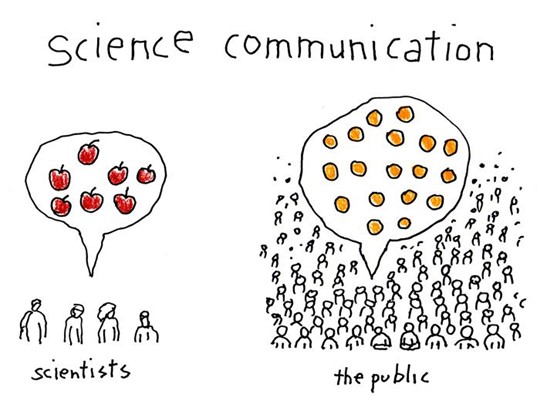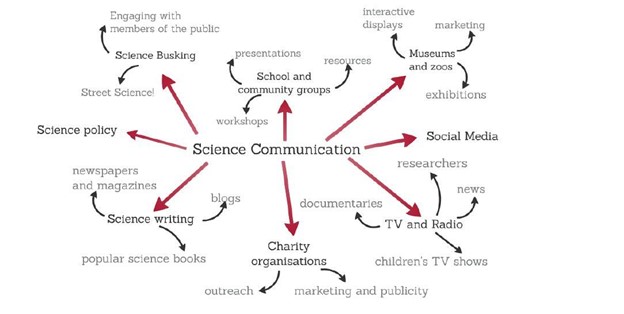Science Communication and Public Understanding
Scientific theories and methods can be complex. This may lead to misunderstandings, cause fear about scientific knowledge, and affect public trust in scientific research. To effectively engage with the public and gain their support, scientists must actively communicate about their work.
Many expect scientists to have good communication skills just because they are experts in their field, but communicating scientific concepts to the public is not an easy task. Due to increased specialization and lack of formal training in science communication, scientists may find it difficult to communicate effectively. Moreover, scientific ideas can be tough to explain as they are filled with technical jargon, which makes communication of these ideas challenging.

Communicating science can be challenging. (Image by Tom Dunne)
In the 19th century, when science became specialized and it became necessary to translate scientific language for the general public, science communication became useful. Since then, it has played an important role in shaping public understanding of scientific research.
Science communication is the act of informing, creating awareness and engaging with audiences, including non-scientists, on topics related to science. It can be spoken or written and occurs at various stages, from initial discovery to peer-reviewed publication. The aim of this practice is to communicate scientific concepts, knowledge, research and methods in an understandable, accessible and useful manner. Science communicators include scientists/researchers, journalists, educators, artists and advisors who communicate science to the public.

Image by Clare Fearon
People can make informed decisions when they have a basic understanding of science. Unfortunately, poor communication about some science topics has led to widespread mistrust and misunderstanding of scientists and their research. Such topics include Climate Change, Genetic Modification, and Vaccination.
However, research has demonstrated that effective science communication can lead to changes in attitudes towards Climate Change, more positive attitudes towards Genetically Modified foods, and an increase in vaccine uptake, particularly during outbreaks of new infectious diseases (Ranney & Clark, 2016; McPhetres et al., 2019; Castro-Barbudo et al., 2022).
Science communication can take different forms, such as Street Science, which offers entertaining and engaging science shows for the community; Science Busking, which uses portable science demonstrations and public speaking skills to attract and inspire people passing by; and Soapbox Science, which involves scientists explaining their research to the public using non-traditional methods such as projectors and computers, but with the help of self-made props. Mass media writing, blogging, podcasting, and social media can also be used to communicate science effectively.

Science busking demonstrating cloud formation (Image by FEGNe)
Effective science communication requires science communicators to focus on their audience’s needs.
Some communicators think that sharing more information with non-scientists can influence them to change their views on topics such as climate change, vaccination or plant biotechnology. However, research suggests that simply providing more scientific information doesn’t significantly impact people’s perceptions, attitudes or behavior. Others think that arguments supported by facts and evidence have the potential to change people’s beliefs. However, it should be noted that factual and evidence-based arguments may not necessarily change most people’s beliefs, particularly if they cannot relate to the information presented.
Rather than overwhelming their audience with technical details and trying to argue out evidence, science communicators must identify the information that is essential to share and present it in a clear and understandable way. Researchers should explain why their work is relevant to their audience, as this is what people care about the most. Repeating this key message throughout their communication will help their audience remember their main point. Also, establishing a dialogue between researchers and the public benefits both. Listening to feedback helps improve the research’s social relevance. At the same time, scientific research can assist the public in making well-informed and evidence-based decisions. Failing to include public voices in the conversation can lead to a loss of public trust and support for researchers. Researchers need to communicate not only their research but also who they are and where they come from. This will help give their expertise context and make them more relatable as human beings. If researchers want people to understand and use their science in their daily lives, they must establish trust with the public.

Communicating agricultural biotechnology concepts to a non-scientific audience (Image by Dennis Baffour-Awuah)
Science communication is an increasingly important skill and practice in the digital age. With social media platforms like Twitter, more scientists and experts are sharing their work with the public. However, there is a need for better training and education to effectively communicate science to the masses. Science communication is vital because it helps people understand science and the world around us. It also builds trust in science, encourages participation in scientific activities, and promotes scientific literacy.
In conclusion, science communication deserves the necessary attention as it is necessary for driving progress and improving the lives of humanity now and in the future, and science communicators must be sensitive to existing communication challenges and aim to build trust and engagement with the public.
References
- Castro-Barbudo, Daniella, et al. “Communication interventions to promote vaccination uptake: A systematic review protocol.” medRxiv (2022): 2022-08.
- Davies, S. R., Franks, S., Roche, J., Schmidt, A. L., Wells, R., & Zollo, F. (2021). The landscape of European science communication. Journal of Science Communication, 20(3).
- McPhetres, J., Rutjens, B. T., Weinstein, N., & Brisson, J. A. (2019). Modifying attitudes about modified foods: Increased knowledge leads to more positive attitudes. Journal of Environmental Psychology, 64, 21-29.
- Ranney, M. A., & Clark, D. (2016). Climate change conceptual change: Scientific information can transform attitudes. Topics in cognitive science, 8(1), 49-75.
About the Author
Dennis Baffour-Awuah is a 2024 Plantae Editor, and holds an MPhil in Nuclear Agriculture from the University of Ghana, where he specialized in Mutation Breeding and Plant Biotechnology. He is a passionate science communicator who enjoys promoting scientific innovations. You can find him on X: @dennisgameplay.



